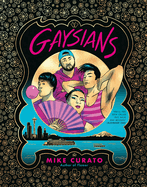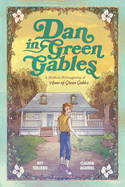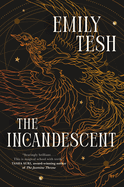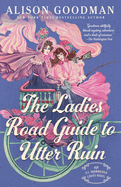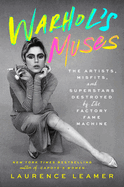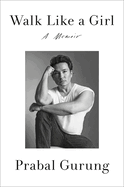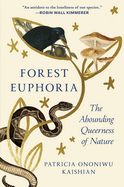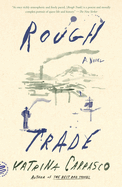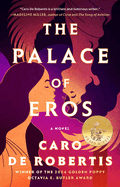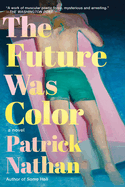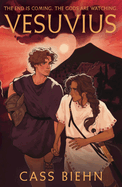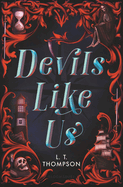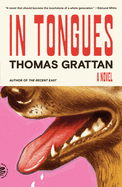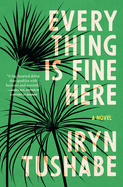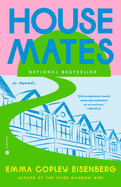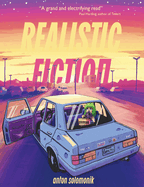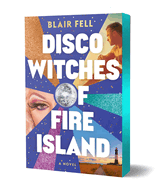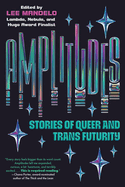Week of Friday, June 6, 2025
Pride Month always makes me feel extra-light in my loafers. Summer brings everything into dreamy soft focus. Even as the culture wars rage on, there is plenty of joy to be found in the stories radiating from LGBTQ+ lives. Comedian Jeff Hiller delineates his "20-year trail to overnight success" in the sidesplitting memoir Actress of a Certain Age, and graphic novelist Mike Curato celebrates a Seattle found family in the heartfelt Gaysians, while Lori Ostlund's engrossing short fiction asks the timeless question Are You Happy?
Whether gay as in happy or queer as in fixing to fight--fellow friends of Dorothy, I hope this week's issue encourages you with boisterous laughter, healing tears, sparks of optimism, and unflinching resilience for challenging times.
Are You Happy?
by Lori Ostlund
The nine short fictions in Are You Happy?, the third book by Lori Ostlund (The Bigness of the World), form a stunning investigation into how violence and family dysfunction reverberate.
"The Peeping Toms" and "The Stalker" are a knockout pair featuring Albuquerque lesbian couples under threat by male acquaintances. The typical protagonist throughout is a writing professor of Scandinavian heritage. In "Just Another Family," Sibyl, back in Minnesota for her father's funeral, finds her childhood bedroom cluttered with Bibles and rifles. Anecdotes the family spins as humorous--such as her mother putting her in the oven when she wouldn't stop crying--reveal hidden trauma.
Characters are haunted by loss and grapple with moral dilemmas. In the title story, Phil's comfortable home life with Kelvin in San Francisco can't outweigh memories of a long-ago plane crash. In "The Bus Driver," Clare ponders telling the police that a popular high school basketball coach's death, presumed accidental, may have been revenge for sexual misconduct involving her best friend.
"Aaron Englund and the Great Great," a prequel to Ostlund's After the Parade, impresses with its third-person limited re-creation of a five-year-old's viewpoint. Each story has the complexity and emotional depth of a novel; endings are often chillingly inconclusive. Freedom versus safety for queer people is a resonant theme in this engrossing collection ideal for Alice Munro and Edward St. Aubyn fans. Happiness might be out of reach for these characters dealing with family trauma, but tracing the way from there to here offers closure. --Rebecca Foster, freelance reviewer, proofreader and blogger at Bookish Beck
Discover: Freedom versus safety for queer people is a resonant theme in this engrossing short fiction collection that explores how violence and family dysfunction reverberate.
A Sharp Endless Need
by Marisa (Mac) Crane
Marisa (Mac) Crane's second novel, A Sharp Endless Need, is a propulsive, perfectly crafted coming-of-age story centered on basketball and queer sexuality. With razor-honed prose, Crane (I Keep My Exoskeletons to Myself) offers authentic descriptions of teen angst and young love as well as exemplary sports writing, and a few memorable sex scenes.
Crane's protagonist, Mack, is a star point guard and the only one at her small-town Pennsylvania high school who is Division-I bound. Between her junior and senior seasons, her beloved but troubled father dies, and on the heels of this trauma, a new girl transfers to the team: Liv is being scouted by the same schools as Mack, and the two are instantly inseparable. Their on-court chemistry is transcendent; off-court, they share good times but are also nearly immobilized by a desire that both are at great pains to conceal. Mack's senior year is marked by larger-than-average difficulties: grieving her father, struggling with her distant, disengaged mother, playing hard with drugs and alcohol, and grappling with a sexuality that feels firmly forbidden in her community. The basketball scholarship she's headed for feels imperative.
Mack's first-person voice is written from a distance of some years, a voice of wisdom looking back on her high school days. This perspective is one of the novel's strengths. The best sports writing evokes not only movement, sensory detail, and skill, but passion, and Crane has a firm grasp on these facets. As Mack's final season nears its close, her relationship with Liv, her college decision, and more hinge upon a handful of choices and impactful moments. A Sharp Endless Need is unforgettable. --Julia Kastner, blogger at pagesofjulia
Discover: This poignant coming-of-age novel combines outstanding sports writing and heartfelt expression of the teen experience, set to small-town Pennsylvania basketball.
And Introducing Dexter Gaines
by Mark B. Perry
If Golden Age movie director Douglas Sirk had turned to writing censor-flouting fiction, he might have come up with And Introducing Dexter Gaines. The novel's actual author, Emmy-winning TV writer Mark B. Perry, has spun a deliciously frothy, unrepentantly melodramatic tale about the Old Hollywood star factory and the celluloid closet.
The novel begins in 1994, with narrator Daniel Root living in humble circumstances in San Jose, Calif. While watching TV, he learns of the death of Milford Langen, who made his name as a producer at 20th Century Fox in the 1940s and '50s. The narrative jumps back in time to the last day of 1951, when dashing 21-year-old Tyler, Tex., native Daniel, who has just moved to Los Angeles to chase stardom, is working as a waiter at Langen's New Year's Eve party. That night changes Daniel's life, but not in the way he is expecting.
And Introducing Dexter Gaines toggles between the 1950s and the 1990s as it teases the question: Why did Daniel leave Hollywood? The story, which features walk-ons by a dozen-odd Old Hollywood A-listers, could be slotted into several Golden Age movie categories: psychodrama, Grand Guignol, and, especially, weeper; there are enough tears shed in the novel to fill Mulholland Fountain, the site of one of the book's many skirmishes. Much of what happens in the novel--a reworking of Perry's debut, City of Whores--is preposterous by the measure of literary realism, but everything that happens is believable by the wonderfully pliable logic of melodrama. --Nell Beram, author and freelance writer
Discover: Mark B. Perry has spun a deliciously frothy, unrepentantly melodramatic tale about the Old Hollywood star factory and the celluloid closet.
Mystery & Thriller
The Ladies Road Guide to Utter Ruin
by Alison Goodman
Readers who love the Regency era but are looking for a feminist, queer-friendly take on it need look no further than Alison Goodman (The Dark Days Club). The Ladies Road Guide to Utter Ruin, the second novel in Goodman's Ill-Mannered Ladies series, is a fabulous romp that handles weighty topics with grace.
Twin sisters Julia and Augusta "Gus" Colebrook, who are distinct among their upper-class peers due to their financial independence and contentment with being unmarried in their 40s, defy Regency society's strict constraints in order to aid women in distress. Their current houseguests are Lady Hester Belford and her partner, Miss Grant. Lady Hester was put into an asylum by her brother, Lord Deele, who became the head of their family when their eldest brother, Evan, was disgraced in his youth. Lord Deele disapproved of Lady Hester's love for Miss Grant. When Gus and Julia find out that Lord Deele knows they rescued Lady Hester, they need to quickly relocate her. Since Lady Hester is still frail from her incarceration, the twins call in assistance from her other brother. Evan, the black sheep of the family, is now wanted by the law. However, Evan is a very handsome outlaw, and Gus is pleased to attempt to clear his name.
Perfectly plotted and both funny and sad, The Ladies Road Guide to Utter Ruin is a delight. Goodman balances several storylines with skill and gives readers a glimpse into the seamier side of Regency life. Fans of Deanna Raybourn's Lady Julia Gray or Veronica Speedwell series will adore Gus and Julia. --Jessica Howard, former bookseller, freelance book reviewer
Discover: In this delightful historical romp, spinster twins stand up to the Regency patriarchy.
The Butcher's Daughter: The Hitherto Untold Story of Mrs. Lovett
by David Demchuk and Corinne Leigh Clark
A journalist draws out the grim story of the accomplice to "the Demon Barber of Fleet Street" in The Butcher's Daughter: The Hitherto Untold Story of Mrs. Lovett, a gritty Victorian thriller by David Demchuk (Red X; The Bone Mother) and debut author Corinne Leigh Clark.
Journalist Miss Emily Gibson is missing. Among her effects, the constables find a series of letters exchanged with a woman whom Miss Gibson believed may have been Mrs. Margery Lovett, hiding out in a convent instead of long since dead in Newgate Prison, as is widely thought.The woman and everyone else at the convent deny it, but as Miss Gibson pursues the truth, her correspondent reveals the events of her life. It's an account of poverty, oppression, and the macabre, graduating from the mundane violence of the butcher shop of her childhood to the doctor's house where she went into service after her father's untimely death.
Demchuk and Clark spin a hair-raising tale, marching readers toward the inevitable climax of Mrs. Lovett's narrative while also maintaining suspense about the fate of the missing journalist. It's clear that nothing good happened, but by whose hand and why? Musical aficionados should be aware that The Butcher's Daughter is set in the world of penny dreadfuls, not Stephen Sondheim, but it reaches beyond into a fully fleshed out portrait of Victorian slums. And if readers are reminded of other gory 19th-century legends, they may be on to something. Demchuk and Clark will keep them on the edge of their seats. --Kristen Allen-Vogel, information services librarian at Dayton Metro Library
Discover: Attend the tale of Mrs. Lovett, with more delightfully dark twists than heretofore imagined, in The Butcher's Daughter.
Science Fiction & Fantasy
The Incandescent
by Emily Tesh
Magic and hubris collide with devastating consequences as a professor attempts to keep the gears of her venerable school turning in the mature, emotionally complex dark academia fantasy The Incandescent by Emily Tesh, winner of the Hugo Award for her first novel, Some Desperate Glory.
Dr. Saffy Walden lives a life no different than that of any other school administrator: there's not as much time to teach as she would like, far more meetings than she would prefer, and the constant toil of keeping the school's magical wards in fit shape to fend off any demons who might want to snack on the student body. Well, perhaps her position as Director of Magic at the Chetwood School is a bit different than the average school administrator. Her 14-hour workdays don't leave much time for hobbies, but work-life balance is no priority since "her career was her life."
Walden balances safety concerns with students' educational needs, which leads her to lock horns with Laura Kenning, the school's gorgeous head demon-hunter. Luckily Walden is one of the world's finest magicians. Bring on the demon that possesses the photocopier in the workroom, the arrogant legacy student, the piles of paperwork, because she has everything under control. Unfortunately, while demons are formidable, no one is as potentially dangerous as a magician who believes she has everything under control.
Fans of Naomi Novik's Scholomance series or Leigh Bardugo's Alex Stern novels, as well as any readers who have wondered what the workday of a Hogwarts professor might look like, should find this story a veritable cornucopia of dark delight. --Jaclyn Fulwood, blogger at Infinite Reads
Discover: A faculty head at a magical prep school battles demons while losing her work-life balance in this mature, emotionally complex dark academia fantasy.
Romance
Dream On, Ramona Riley
by Ashley Herring Blake
Ashley Herring Blake (Make the Season Bright) returns with another heart-fluttering sapphic romance sure to enthrall readers. Set in fictional Clover Lake, N.H., Dream On, Ramona Riley is a charming small-town-meets-Hollywood romance featuring a fat protagonist and the diverse supporting cast--characters of different ages, gender expressions, and body sizes--that fans of Blake's previous works have come to expect.
Ramona Riley, who has lived in Clover Lake all her life except for a short stint at the Rhode Island School of Design, works at the diner where Dylan Monroe, Hollywood's bad girl, is filming a big-budget romance (based on the in-world novel from Blake's earlier work Iris Kelly Doesn't Date). When the women connect, they learn they have been pining for each other since they first met as young teens and exchanged a kiss.
Dream On, Ramona Riley is full of sweet and tender moments that are matched with plenty of the sexiness Blake fans are familiar with. Without taking focus away from the couple, Clover Lake feels like the best summer vacation town, full of delightful small businesses and people. Blake excels at tough, emotional conversations, and this novel is no exception as the couple navigates family troubles, public image, and dreams set aside. Blake's longtime readers will enjoy a glimpse at past characters, and new readers will love the heart, humor, and drama.
Perfect for fans of contemporary rom-coms such as Jasmine Guillory's Flirting Lessons or Alexandra Kiley's Kilt Trip, Dream On, Ramona Riley will make readers fall in love with Clover Lake. --Alyssa Parssinen, freelance reviewer and former bookseller
Discover: When small-town Ramona Riley meets Hollywood's Dylan Monroe on the set of her latest movie, chemistry abounds in this charming and sexy sapphic romance.
Graphic Books
Gaysians
by Michael Curato
Acclaimed children's author/illustrator Mike Curato (Little Elliot, Big City; Flamer) delivers his debut for adults: Gaysians, a poignant graphic novel about a young East Coast transplant to Seattle in 2003, where he finds a welcoming community of gay Asians. Curato opens with introductions to his primary players--newly out AJ at his first gay bar; Korean adoptee and gamer John; lothario Steven; and activist, seamstress, drag queen K.
For AJ, spilling his drink on K turns into a fortuitous entry to gay Seattle life, which is like "nothing I've ever experienced before." Biracial Filipino AJ left upstate New York to escape his violent, unaccepting father. His plight triggers K's maternal instincts, and she connects him to work and subsidized housing in Seattle's Capitol Hill "gayborhood." Most importantly, she invites him out for dim sum, where he's warmly welcomed into the "Boy Luck Club."
While revealing AJ's coming-of-age, Curato also provides intimate windows into the lives of AJ's found family. Curato writes with open empathy, developing each of his characters with nuance and complexity. He favors mostly monotone (blues) and duotone (blues and magentas) washes, with glimpses of the past muted in black, white, and grey; full-color is reserved for spectacles and the spectacular, including AJ's first Pride parade and the Lunar New Queer Festival.
"We are not a monolith," Curato writes in his afterword, "and it would be impossible for me to write a story that captures the essence of every queer Asian person." His notable gift here is to discover a myriad of gay Asian stories, with the heartfelt invitation to "add to the story [and] create volumes together." --Terry Hong
Discover: Children's author/illustrator Mike Curato's adult debut is a gorgeously vulnerable graphic novel about the joys and challenges of finding family among Seattle's gay Asians.
Love Languages
by James Albon
Graphic novelist James Albon goes romantically global in Love Languages, a polyphonic romance featuring two expats of diverse backgrounds and their Parisian meet-cute beginning. Sarah, from London, is a self-described "slave to the capitalist grind" who aspirationally carries around 99 Ways to Re-energise and Be Your Best Incarnation in her bag. One morning, overzealous street mimes cause her to tumble, but the incident becomes the shake-up catalyst she didn't know she needed that transforms her life. Watching the scene with alarm is Ping from Hong Kong, working as an au pair. Their serendipitous meeting the next day, sharing English, French, and Cantonese, leads to a coffee and pastry--and, for Sarah, becomes a reminder of a Hong Kong trip so sweet that she's inspired to return to a long-neglected Cantonese language app. Another chance encounter, this time at the Louvre, progresses to a promising connection. Nurturing their polyglot conversations just might lead to true love.
Albon opens with a delightfully clever title page demonstrating the power of languages to both separate and connect: here, a French-speaking writer enthusiastically explains the narrative about to be revealed, while Sarah blushingly admits she can't understand. The story that unfolds--Sarah's--is all about what gets lost and found in leaving, attempting, adopting various languages. As an artist, Albon employs gorgeously riotous color for the everyday life that Sarah hasn't quite learned to enjoy. Initially shrouded in blues and browns, Sarah recognizes bright-yellow-jacketed Ping as a beacon ready to light her way out of drudgery and isolation. --Terry Hong
Discover: Two lonely expats meet in Paris and fall in love while cultivating mutual understanding in multiple languages in this polyphonic and riotously colorful graphic novel.
Everything Is Fine, I'll Just Work Harder: Confessions of a Former Badass
by Cara Gormally
Cartoonist Cara Gormally, who's also a biology professor and researcher, resonantly transforms their journey from debilitating trauma to radical acceptance into their debut graphic memoir, Everything Is Fine, I'll Just Work Harder: Confessions of a Former Badass. Back in those "badass" days, Gormally woke early, ran many miles while making endless mental lists, then dashed to university to teach, direct projects, and continue research, only to continue working at home before going to bed late with a book. "On a day that began like any other day," that hamster wheel of achievement sputtered when their rapist sent a friend request. Their tenacious attempts to be their "regular badass self" proved impossible. Excuses of denial--"It was years ago," "I'm fine," "This shouldn't affect me"--finally culminated with a lifesaving recommendation: "Find a trauma therapist." Even when "the process felt neverending," Gormally persevered to "finally enjoy being and becoming."
Gormally works powerfully in simple black-and-white line drawings enhanced with shades of blue. When emotions overwhelm, the color deepens to resemble torrential water that threatens to flood the page, spreading over and breaking through borders and panels. Gormally cleverly depicts their head as an untethered balloon--detached and floating further away from their body--whenever they're caught in the vortex of must-dos, ignoring everything and everyone, including and especially their own needs. "The me who wrote this book is already a past-me existing only in my heart now," Gormally reveals in their author's note. Their survival and recovery undoubtedly provides both balm and inspiration that others, too, might reclaim their lives. --Terry Hong
Discover: Cara Gormally's debut graphic memoir, Everything Is Fine, I'll Just Work Harder: Confessions of a Former Badass, deftly depicts their transformative journey from trauma to healing.
Biography & Memoir
Actress of a Certain Age: My Twenty-Year Trail to Overnight Success
by Jeff Hiller
In terms of celebrity, Jeff Hiller's name may not carry the same gravitas as Demi Moore or Taraji P. Henson. His unforgettable face might resurface vague memories of a Pilgrim in a steady Snickers campaign, a flight attendant on 30 Rock, or a naked man bothering Ricky Gervais in the film Ghost Town. One might describe Hiller's acting career as niche, but in Actress of a Certain Age, the comedian delivers a performance of a lifetime, nimbly folding tenderness and vulnerability into a riotously disarming memoir about his passion for performance.
Hiller got lucky with ferociously supportive parents, but standing more than six feet tall and weighing 200 pounds in the sixth grade, with "a gay lisp" and "a nervous and girlish giggle," he was constantly tormented with the F-slur and other forms of bullying at school. Church was his haven, however, and its theatrical elements gave Hiller his first taste of dramaturgy. For a time he considered entering the ministry, but deep down he really "just felt called to be a singing, dancing, wocka-wocka showman of God. Pastor Charo! 'In the name of God, let's cuchi-cuchi!' " So, after a rather cursed experience as a social worker, he decided to pursue his true purpose, doggedly running the humbling gauntlet that is showbiz.
As he documents his gradual ascent, through improv groups and commercial gigs before landing his starring role as Joel on the endearing HBO comedy series Somebody Somewhere, Hiller is a generous and entertaining storyteller. Actress of a Certain Age distills the feel-good, laugh-till-you-cry reminiscences of a sweet, silly, and thoroughly lovable man establishing the career of his dreams. --Dave Wheeler, senior editor, Shelf Awareness
Discover: Comedic actor Jeff Hiller delivers a performance of a lifetime in this laugh-till-you-cry memoir about doggedly pursuing his dream to be in showbiz.
Warhol's Muses: The Artists, Misfits, and Superstars Destroyed by the Factory Fame Machine
by Laurence Leamer
Laurence Leamer has developed a literary specialty: chronicling the lives of the women behind manipulative male artists. On the heels of Capote's Women and Hitchcock's Blondes comes Warhol's Muses: The Artists, Misfits, and Superstars Destroyed by the Factory Fame Machine, which will burnish Leamer's deserved reputation as a master of the upmarket tawdry.
In the mid-1960s, pop artist Andy Warhol entered the world of filmmaking and needed attractive faces to light up the screen. The bottomlessly researched Warhol's Muses spotlights Baby Jane Holzer, Edie Sedgwick, Viva, Nico, Candy Darling, and five other women who were part of the stable of novice actors Warhol called his "Superstars." Leamer's biographical sketches present the featured muses as disproportionately troubled and vulnerable, and while they're not all tragic figures, the book highlights instances of their drug-abetted self-destruction. Meanwhile, Warhol comes across as someone quite different from the soft-spoken force for good he's often made out to be; here he's something of a calculating social climber (quite a few of the Superstars were women of means). As Leamer sees it, the Superstars "softened [Warhol's] queerness for public consumption and brought him a dose of added glamour, even respectability."
Leamer makes a solid case that, while many of Warhol's women have name recognition, "their contribution to the artistic world they helped to define--and their own artistic ambitions, personal struggles, and occasional triumphs--have been largely overlooked." Warhol's Muses helps redress the injustice. It's a scintillating read that marries two improbable bedfellows: the feminist and the scandalous. --Nell Beram, author and freelance writer
Discover: Laurence Leamer, who specializes in chronicling the lives of the women behind manipulative male artists, focuses on 10 of Andy Warhol's Superstars in this scintillating read.
Walk Like a Girl
by Prabal Gurung
Discover: In this charming memoir, fashion designer Prabal Gurung, who was raised in Nepal, tells his story with élan and a wide-open heart.
Theater Kid: A Broadway Memoir
by Jeffrey Seller
Broadway producer Jeffrey Seller was a driving force behind several unexpectedly triumphant out-of-left-field musicals. In Theater Kid: A Broadway Memoir, he describes with candor and flair a life that seemed as unlikely to be a smashing success as those shows were.
Seller was born in 1964 and grew up in Oak Park, Mich., "the poor enclave in a rising Jewish suburb" north of Detroit. His parents were combative and frequently on the brink of divorce; his father largely left it to his wife to support the family with hourly wage work. When Seller was in fourth grade, he was cast in his Sunday school's Purim production; while in the play, he felt "filled with purpose for the first time." He stuck with the performing arts--at school and through community productions--and came to believe that through the theater, "I will get out." He did, and he has the Tony wins to prove it.
Theater Kid is told in the present tense in three acts, and some of Seller's lean, rapid-fire recollected dialogues could pass for excerpts from a polished script. He has a light touch, whether he's contemplating being gay and adopted or engaging in Broadway-insider wheeler-dealing. A reader needs no prior familiarity with Rent, Avenue Q, In the Heights, or Hamilton, all of which Seller had a hand in, to enjoy chapters devoted to the origins of these against-the-odds hits. For each show, Seller has written a gripping underdog story, which is another way to describe his memoir. --Nell Beram, author and freelance writer
Discover: With candor and flair, the Tony-winning producer behind Rent, Avenue Q, In the Heights, and Hamilton recalls a life that seemed as unlikely to be a smashing success as those shows were.
Political Science
Lawless: How the Supreme Court Runs on Conservative Grievance, Fringe Theories, and Bad Vibes
by Leah Litman
Deploying humor and pop-culture references to drive home its persuasive message, Lawless by former U.S. Supreme Court clerk Leah Litman is a call to action for those reeling from Supreme Court decisions in such cases such as Dobbs v. Jackson Women's Health Organization and West Virginia v. EPA. To make change happen, she insists, one must first understand the court's jurisprudence.
When it comes to abortion access, voting rights, the influx of money in politics, and "temper tantrums about LGBT equality," the court is no longer an impartial interpreter of the law, asserts Litman. Rather, the highest court in the U.S., flaunting its conservative supermajority, has obliterated judicial precedent to instead align its rulings with Republican "talking points" and grievances.
Litman skillfully distills complex case law into easily digestible facts and offers helpful historical and political context for the immense power the court has accrued. A University of Michigan Law School professor and co-host of the podcast Strict Scrutiny, Litman irreverently harnesses themes gleaned from television shows such as Game of Thrones and Arrested Development and the films American Psycho and Barbie to expose flaws in the court's rulings.
Taking the long view, Litman encourages political engagement at the local level to turn the situation around at the national level. She cites the case of Kris Mayes, a Democrat who won the 2022 race for Arizona attorney general by just 280 votes, then went on to save an innocent man from an "absolutely ghoulish" Supreme Court ruling. The solution isn't stacking the courts with liberals. Rather, Litman concludes, it's about making sure "that courts do not get in the way of democracy." --Shahina Piyarali
Discover: Law professor and podcaster Leah Litman deploys humor and pop culture references as she makes a persuasive case that the U.S. Supreme Court is no longer an impartial interpreter of the law.
Nature & Environment
Forest Euphoria: The Abounding Queerness of Nature
by Patricia Ononiwu Kaishian
Patricia Ononiwu Kaishian's insights about the natural world and her skill in presenting them are nothing short of stunning. Forest Euphoria: The Abounding Queerness of Nature undermines the constrained, ideologically limited lens that cultural norms have imposed upon science and its exploration of nature throughout history. In Kaishian's work, the term "queer" is "a call to action, charging us to reject the many binaries that shape our current reality to the detriment of everyone."
Part of the binary that Kaishian powerfully disputes is the dominant hierarchical concept of "human exceptionalism," in which it's considered a given that anything present in the natural world exists to be in service to human beings and not as entities of their own. Kaishian credits native knowledge and her time at ESF, the Environmental Science and Forestry program at SUNY Syracuse, where she worked with fungal taxonomist Alex Weir and learned how to "decolonize" her own practice of science.
Using case studies from the natural world (corvids, fungi, eels, etc.), which she's studied throughout her development as a mycologist, Kaishian achieves something truly singular. She establishes a kaleidoscopic vision of interconnectedness that encompasses intricate webs of communication and cooperation, while acknowledging that much always remains to be discovered.
Forest Euphoria is an evocative work of profound creativity that combines scientific rigor, personal narrative, and a call for an outlook that is better, more inclusive, more true and genuinely scientific. Forest Euphoria is not just for scientists or academics; it's for anyone who cares about the future of our planet, anyone who is willing to question the assumptions that have contributed to our current environmental crisis. -- Elizabeth DeNoma, executive editor, DeNoma Literary Services, Seattle, Wash.
Discover: Forest Euphoria is an irresistible and intimate celebration of the varied vastness of life throughout nature.
Now in Paperback
Rough Trade
by Katrina Carrasco
Katrina Carrasco (The Best Bad Things) blends deeply researched historical fiction with riveting queer adventure in Rough Trade, the spectacular second installment of her episodic crime series about the undeniably charming antihero Alma Rosales.
It's the summer of 1888, and Alma's crew is working the Tacoma docks of Washington Territory. Their cover story is that they're stevedores, but smuggling opium is their real trade.
In the months that follow a drug bust on their ship, several new players wander onto Alma's docks and threaten the tidy little business she runs under the protective care of seductive socialite Delphine Beaumond. Among those is Bess Spencer, Alma's former partner at the Pinkerton Women's Bureau of investigators, from a lifetime ago. But the real fuse lights when dead bodies start turning up under suspicious circumstances, and with signs of injection. Alma risks a swarming police presence that could irreversibly upset the life she's only recently built for herself in Washington, after escaping tragedy elsewhere.
Carrasco writes with a brisk pace and cheeky playfulness that offset the rugged terrain and dicey stakes. Alma carries a queer and irresistible swagger as she shapeshifts into her public persona, Jack Camp, the roughest man in town. And her sexual tension with both Bess and Delphine gin up a satisfying heat. So much of the fun in this novel pivots on the divide between public and private presentations, highlighting how simple it becomes to defy the law when one's gender and sexuality are already at odds with it.
Rough Trade is an addictive treat sure to please fans of Sarah Waters and HBO's Our Flag Means Death. --Dave Wheeler, senior editor, Shelf Awareness
Discover: Detailed historical research bolsters dynamic crime fiction in this spectacular queer adventure about opium smugglers in 19th-century Washington Territory.
The Palace of Eros
by Caro de Robertis
The tale of Eros and Psyche gets a queer update in The Palace of Eros, the lush and thoughtful novel by Caro De Robertis (The President and the Frog; Cantoras).
Psyche grows up in the shadow of her older sisters, but when she comes of age, her beauty becomes so great that her father's household is overwhelmed by suitors coming to stare at her, but not to offer marriage, because nobody wants to marry "this girl whose face and body had been scraped raw by glances from across the land." Aphrodite becomes jealous that Psyche is drawing so much attention from her. She sends her daughter, Eros, the deity of desire, who is "a woman and also, at the same time... more," to punish Psyche by making her fall in love with an unworthy man. But Eros is overwhelmed when she sees Psyche and devises a plan to make Psyche her wife instead. All Eros has to do is keep her hidden from the other gods, making sure they are never together in the light.
De Robertis adapts the Greek myth into a novel that is sensual and subversive. When Psyche can no longer tolerate the mystery of her husband's identity and she exposes her in the light, she unwittingly reveals their hidden sanctuary to the other gods. Then she doesn't only need to overcome the trials Aphrodite gives her, she and Eros must also heal their broken trust and forge the beginnings of a new world where those who defy expectations can belong. Fans of Circe by Madeline Miller and Daughters of Sparta by Claire Heywood will be enthralled. --Kristen Allen-Vogel, information services librarian at Dayton Metro Library
Discover: This queering of the Eros and Psyche myth melds sensuality, lush prose, and a quest for self-determination.
The Future Was Color
by Patrick Nathan
The Lavender Scare looms over the events portrayed in Patrick Nathan's exquisite second novel, The Future Was Color, like one of those unspeakable horrors that Hollywood screenwriter George Curtis conjures to threaten the lives of ordinary, freedom-loving Americans in his cheaply made science fiction flicks. George lives a meek existence in the summer of 1956, humbly tapping out new scripts in a sweltering office that he shares with two or three others, depending on who "either quit or disappeared or got blacklisted" in the stifling era of McCarthyism.
Privately, however, George is a quiet sort of renegade. A Hungarian immigrant to the United States, he has witnessed the rise of fascism and the cost of war. He longs to write something of greater political consequence than the black-and-white movies that studios lace with their pro-war propaganda. He also longs for the touch of his colleague Jack Turner. When friend and actress Madeline Morrison invites George to be a writer in residence at her Malibu estate, the opportunities for greater fulfillment begin to unfurl before him.
Nathan (Image Control; Some Hell) writes with the eloquence of a nimble mind working at the height of his powers. Gripping from the first sentence, The Future Was Color braves the atomic era with a canny allegiance to human tenderness and connection. George's story is one of resilience, and Nathan's Hollywood is sure to dazzle any readers who were captivated by Anthony Marra's Mercury Pictures Presents. Profound, life-affirming, and splendidly seductive, The Future Was Color deserves to become a new lodestar in the ever-expanding constellation of gay literature. --Dave Wheeler, senior editor, Shelf Awareness
Discover: The dazzling Hollywood setting of Patrick Nathan's life-affirming novel pales in comparison to the vibrant legacy of one lowly screenwriter who quietly defies expectations in the McCarthy era.
Exhibit
by R.O. Kwon
R.O. Kwon's second novel, Exhibit, is a searing study of art, desire, and bodily and intellectual freedom. Northern California photographer Jin Han earned notoriety for her triptychs depicting "religious people in states of worship." Given her lapsed Christian faith and her inclusion of self-portraits copying her subjects' poses, she has received hate mail and a boycott. Jin then questions her own motives: "did I, by reviving what I grieved, risk indulging in tragic kitsch?" Interspersed in the narrative are anguished letters to a God she no longer believes in.
Doubt divides Jin from her devout parents in Seoul, while sexual needs drive her and her husband, Philip, apart. In the opening scene, Jin is immediately drawn to fellow Korean American Lidija Jung, an injured ballet dancer, at a party. Lidija shares Jin's interest in BDSM, which Philip is reluctant to explore. Moreover, Philip has decided he wants a baby, but Jin prefers to remain childfree. Little surprise, then, that Jin becomes increasingly intimate with Lidija, her muse. A new project even showcases the bruises and blood from their encounters. Soon, Jin is called back to Korea when her mother is hospitalized--an incident Jin's vestigial religious mindset leads her to interpret as punishment.
Kwon's sentences are like grenades, carefully wrought and concentrated with meaning. Staccato phrasing and poetic vocabulary allow Kwon (The Incendiaries) to pack much into this intense novel's short length. Though the prose threatens to overwhelm a somewhat familiar plot, the focus on art and independence, as well as the bisexual representation, make this stand out. It's ideal reading for fans of Melissa Broder, Teju Cole, and Brandon Taylor. --Rebecca Foster, freelance reviewer, proofreader and blogger at Bookish Beck
Discover: In R.O. Kwon's bold second novel, a Korean American photographer depicts her loss of faith, as well as her bisexuality and attraction to BDSM, through her art.
Children's & Young Adult
Dan in Green Gables: A Modern Reimagining of Anne of Green Gables
by Rey Terciero, illus. by Claudia Aguirre
Dan in Green Gables, an energetic and enchanting YA graphic novel, embodies the spirit of L.M. Montgomery's Anne of Green Gables while giving it a shiny new take that compassionately incorporates chaotic family dynamics, friendship, queer identity, religion, bullying, and--above all--love.
In this full-hearted "reimagining," Dan is not a sunny, red-haired 11-year-old orphan in Canada but a sunny, red-haired 15-year-old gay kid in Tennessee. It's spring of 1995 and, although he longs for some stability, Dan Stewart-Álvarez is used to starting over, thanks to life on the road with his free-spirited but troubled mother. When she abruptly abandons him with virtual strangers--his sweet, folksy Mawmaw and gruff, hard-edged Pawpaw--this bubbly, lighthearted teen is flattened. But only for a moment. Soon he's making friends, resisting bullies, and trying to win over his homophobic Pawpaw and the conservative church they attend.
Rey Terciero (one of the pen names used by award-winning author of Free Lunch Rex Ogle) puts his own perceptive, empowering stamp on the classic story, with lettering done by Lor Prescott. Comics artist Claudia Aguirre (Lifetime Passes) dramatically reflects Dan's bright personality, fierce loyalty to friends and family, and periodic explosions of sadness or anger through expressive illustrations on fully saturated backgrounds. The artist uses mood-mirroring color to fill panels featuring intense emotion and highlights important moments with perspective changes, bursting stars, overflowing hearts, and motion lines. Dan in Green Gables stands alone as an uplifting and gratifying graphic novel, relatable to any reader who believes, like Dan, that "happiness is a revolution." --Emilie Coulter, freelance writer and editor
Discover: In this radiant queer reimagining of a classic, a charismatic teen keeps his spirits up and endears himself to his conservative community after being left unexpectedly with his Tennessee grandparents.
Hick: The Trailblazing Journalist Who Captured Eleanor Roosevelt's Heart
by Sarah Miller
Sarah Miller, author of Hanged!, pens an intriguing, engrossing young adult biography in Hick, about pioneering female journalist Lorena "Hick" Hickok. Miller, like her subject, "lure[s] readers in at the start and hold[s] them captive until the end" as she recounts Hick's life, her career, and her complex relationship with First Lady Eleanor Roosevelt.
Using a wealth of sources, including some 3,500 personal letters between Hick and Roosevelt, Miller details the trajectory of Hick's life, from a 14-year-old servant to "the first woman at the Associated Press whom editors 'trusted with straight news leads on big stories.'" Because Hick's editor "never hesitated to give her the best story that came along," the journalist was ushered into the world of the Roosevelts. Hick's assignment to cover the First Lady of New York as her husband campaigned for the White House became a deep friendship that blossomed into a love affair; their relationship withstood not only the test of time, but also the national spotlight.
Miller delivers a well-researched, fascinating biography of a person who played an important and uncommon role in U.S. history. The author gives a crystalline depiction of Hick's frustrations as a woman in a male-dominated field ("My God, how tired I get of being a woman reporter!") and viscerally portrays the struggles Hick and Eleanor experienced as women in a queer relationship under the blinding lights of national politics. Readers who enjoyed Most Dangerous by Steve Sheinkin or Amelia Lost by Candace Fleming will likely appreciate both Miller's writing and the extraordinary life of Lorena Hickok. Miller includes a note on language and the use of "queer," as well as extensive backmatter, an author's note, sources, and notes. --Jen Forbus, freelancer
Discover: The life of a pioneering, queer female journalist is the subject of this accessible and captivating biography for young adults.
Vesuvius
by Cass Biehn
Vesuvius by Cass Biehn is a compelling YA historical fantasy debut brimming with political drama and queer love.
Sixteen-year-old Loren knows Pompeii will burn; he has visions of its destruction that feature a copper-haired young man. Then, 17-year-old Felix, the individual from Loren's visions, arrives in Pompeii and angers a power-hungry statesman by stealing a sacred helmet. Loren, thinking this an opportunity to change the city's fate, offers Felix protection while he attempts to understand the strange boy's role in Pompeii's demise. Felix, whose memories have been inexplicably blocked by some unknown force, typically trusts no one--especially not the rich. Loren, though, has yet to disclose his wealthy identity. He hopes to improve the Roman colony (once it's saved) by earning a seat on the council through his own merit. Even though Felix is caught off guard by "this mad, impulsive boy," he accepts--straying from Loren feels "like wading too far from shore." As politically motivated murders pile up and Vesuvius's eruption nears, the boys brave their uncertain future hand in hand.
This dual POV narrative combines a modern voice with a convincing historical backdrop, mythical undertones, and subtle magic. Biehn builds emotionally complex characters: Loren loves Pompeii "the way Icarus loved the sun. Bold. Bright. Willing to burn for it"; Felix resents his own significance, declaring, "I'm not Hercules. Or Achilles. I'm just Felix." Secrets and seedy politicians chase the protagonists to the eruptive climax. Biehn brilliantly pits choice against destiny in this exciting and immersive adventure. --Samantha Zaboski, freelance editor and reviewer
Discover: A young man attempting to stop Pompeii's destruction falls in love with the boy who might be responsible for the city's doom in this gripping YA historical fantasy.
Get Real, Chloe Torres
by Crystal Maldonado
Three ex-best friends reunite for one last pre-college adventure in this YA road trip novel full of laughter, healing, hijinks, and butterfly-inducing kisses.
Eighteen-year-old Chloe Torres isn't ready to be an adult. So, when she is gifted three tickets to her favorite band's reunion concert, she knows exactly who she wants to invite: her ex-best friends from middle school. Added bonus? They'll drive across the U.S. to get there and complete their old BFF bucket list along the way. It's a rocky start: Chloe tries not to think about the crush she had on Sienna or about the kiss she and Ramona shared at 14; meanwhile, Ramona and Sienna both have other motives for agreeing to this plan. After impromptu Niagara Falls and Indy Zoo visits, the girls hit a groove that might itself carry them to the concert. But the confusing moments Chloe has with Ramona--"she touched my elbow last night and i FELT THINGS????????"--kind of have her freaking out.
Get Real, Chloe Torres by Crystal Maldonado (Fat Chance, Charlie Vega) is a joyfully adventurous friendship story and a thrilling sapphic rom-com told in Chloe's charming first-person voice. Refreshingly, the girls avoid repeating their breakup mistakes by stopping to communicate when tensions soar. Maldonado is excellent at showcasing a teen doubting their college path ("Ever since I committed, it feels like there's been this cloud hanging over me.... Is that what I want to spend every day doing for my job?") and remarkably depicts ADHD, including time blindness and scatterbrained thoughts. All this, plus the breathtaking kisses, make it a validating story about queer love and joy. --Samantha Zaboski, freelance editor and reviewer
Discover: Three ex-best friends road trip to see their favorite band and complete their middle-school bucket list in this lighthearted YA novel about friendship, shenanigans, and sapphic love.
Devils Like Us
by L.T. Thompson
Devils Like Us by L.T. Thompson (The House That Whispers) is a sharply written, early-19th-century YA fantasy that follows three queer and trans teens as they uncover a magical secret society.
When Cas and best friend Remy were 10 years old, Remy's father went missing. Cas had a vision of Remy's father's death and told Remy, who ended their friendship. Cas's clairvoyant visions have been a secret ever since. Remy, meanwhile, has spent the past eight years investigating her father's disappearance with the help of her friend Finn; she believes the Order of Lazarus, a secret society focused on the supernatural and based at Eden, a seminary school in Maine, is responsible. The three teens are brought together when a friend of Cas's accidentally witnesses one of Cas's visions and is shipped off to Eden. Cas, Remy, and Finn launch a rescue mission that exposes mystical secrets and leads to personal revelations.
Magic and mysticism deftly share space with examinations of self in this gripping, profoundly insightful novel. The narration is divided among Cas, Remy, and Finn, all who struggle with identity issues. Trans Cas battles gender dysphoria while queer; Catholic Finn hides her "badness" from the world; and Remy, so wrapped up in her family's issues, hasn't felt "wild and invincible and free" in years. Thompson effortlessly twists their personal journeys into an adventurous plot without ever slowing the pace. Their self-explorations pair well with the occult mysteries, making for a dynamic, heartwarming first entry in Thompson's coming-of-age fantasy series. --Lana Barnes, freelance reviewer and proofreader
Discover: A trio of queer and trans teens discover a magical secret society and their true selves in this sharply written, action-packed YA historical fantasy.
LGBTQ Pride
Generation Queer
Kimm Topping: Challenge and Diverge
 |
|
| Kimm Topping (photo: Ally Schmaling) |
|
Kimm Topping is an artist/educator, writer, and historian dedicated to preserving LGBTQ+ history. As founder of Lavender Education, a national program promoting LGBTQIA+ history and youth leadership, Topping leads workshops, professional development, and historic walking tours. Their first book, Generation Queer (Tu Books), is YA nonfiction highlighting the stories of LGBTQ+ youth activists.
Please tell our readers a bit about Generation Queer.
Generation Queer is the first-ever nonfiction YA book to feature illustrated biographies of queer and trans youth activists who are leaders in education, arts, and organizing. While it's full of stories and resources for young readers, it also includes resources for adults, especially educators. Readers will learn about LGBTQ+ activists who are representative of a generation that values intersectional, collaborative social justice and who are working to build a world that values everyone.
You note that everyone covered in the book gave enthusiastic consent to be included, lives in the U.S., and started their activism before the age of 24. How did you find and choose the people you wanted to include?
I'm a youth worker by training so I started with people I had already organized with in Massachusetts, including L Austin-Spooner and Katherine Ferreira O'Connor. They were young leaders in the Yes on 3 campaign in Massachusetts, which was a 2018 ballot question determining if trans people could access public accommodations. From there, I began researching other youth activists around the country through LGBTQ organizations, scholarships and awards, and social media. I started with about 100 people and narrowed it down as I began interviewing folks, to express a range of experiences and identities.
Why did you divide the individuals in the book into "organizers," "artists," and "educators"?
At first, the book was going to feature 30 activists in one chapter. However, as I spoke with young people, they didn't necessarily resonate with the term "activist." It's a term that was put on them because they stood up for what was right. So, I moved away from this broader term, and more toward ways of describing their work. What did they do to create an impact? As each of the stories emerged, there were three main themes: arts, organizing, and education.
I also wanted to include brief history sections and resources for readers. So, this three-section model helped me to break down queer history into these three distinct ways of advocating for change.
In your introduction, you say "the future that young people are creating the road map to is inclusive." How did you arrive at this belief?
This is a thread that appears in each of the interviews and all my research and reading about youth-led movements for change. While each person approaches their advocacy work with a different lens or approach, one thing remains true through all the conversations: they all want to see a future where everyone is included. Their vision is not a future where we accept people despite their differences, but a future where we embrace, celebrate, and recognize everyone because of their unique experiences, identities, personalities, and values. The vision of the young people I spoke with was not about accepting the bare minimum of acceptance. It was about envisioning a future where everyone is included fully.
You write, "Saying someone or something is queer doesn't necessarily tell you anything about gender or sexuality (though it can), and that's what people find so freeing about it." Would you talk a bit about the title of your book and "queer as a verb?"
I teach a class called Queering Education, which is essentially about questioning and analyzing what we've been told is normal or acceptable. We might call this the "hidden curriculum." These are the messages we receive that tell us what is expected and what is perceived as valuable. For example, what message is sent when there is a binary dress code and girls are more often reprimanded for that dress code, or Black students are disciplined for their natural hair? What value is being communicated when African American AP History is removed from the offerings in Florida's curriculum? When younger students are asked only about "mom and dad" at home, which family structures are being left out?
On the flip side, what are the meaningful ways that we can communicate inclusion, welcoming, belonging, and community? To be queer is to challenge and diverge from the norms or standards that are imposed on us. So, when I say that we're using queer as a verb, it is about action. It's about being who we are despite arbitrary norms. It's about challenging dominant narratives and including everyone, because to be human is to be a multitude.
There's so much in here beyond the people-- timelines and histories, popular musicians and artists, sidebars about design accessibility and drag story hour. How did you decide what you wanted to include?
It's funny to think back to how full my brain was while writing this book. There's simply so much to learn about and that's when I decided to design this book as a "curiosity guide." I wanted readers to fully engage with and enjoy the biographies, while also putting the book down and running off to learn more about specific topics.
As a reader myself, I like to experience a book as a full learning experience. So I might read 10 pages then spend 10 minutes watching a video about a person who was mentioned. With Generation Queer, I wanted to create a similar experience where readers were encouraged to do their own research, to reach out to organizations to learn more about them, and to seek out more stories about people or periods of history.
Is there anything you'd like to say to Shelf Awareness readers?
Thank you for creating and supporting indie bookstores. When I first got the contract for this book, I spent many hours hanging out at All She Wrote Books--the local feminist, queer bookstore in Somerville, Mass.--chatting with owner Christina Pascucci Ciampa about the launch event for this book. Your work to support debut authors, marginalized authors, local authors--it is all so important and needed. I can't wait to come by your local bookstore and get to know you and your communities as I'm traveling around promoting Generation Queer! --Siân Gaetano, editor, children's and YA, Shelf Awareness
The Writer's Life
Reading with... Vivian Blaxell
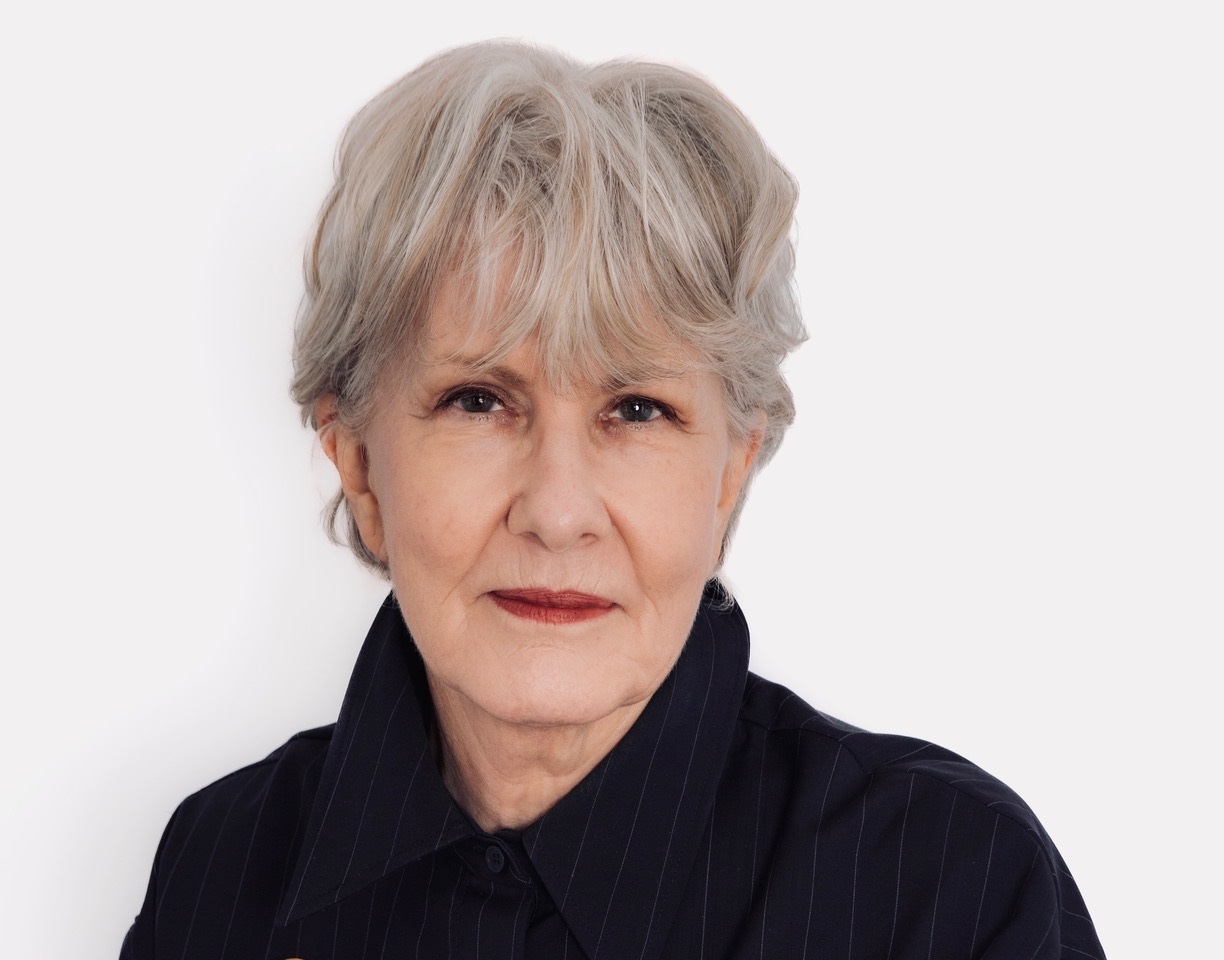 |
|
| Vivian Blaxell (photo: Rosi Carllos) |
|
Vivian Blaxell is a former mental health nurse and a former university professor of political philosophy and Japanese history. She has lived and worked in Hawai'i, Vermont, the District of Columbia, Maryland, Kyoto, Beijing, Istanbul, and Sydney, and now lives in Melbourne/Naarm, Australia. She transitioned in 1968, and co-founded Tiresias House, the first refuge and support center for trans people by trans people in Australia. In her new essay collection, Worthy of the Event (LittlePuss Press), Blaxell takes readers on a witty and expansive sweep through history.
Handsell readers your book in a handful of words:
Worthy of the Event is about people who might be me and people whom I might be. It is about me in the world and the world in me.
On your nightstand now:
The American Library edition of Gary Snyder: Collected Poems. I can't write poetry, so I don't write poetry, but I do read poetry because poetry teaches me how to write what I write, to put music into my own writing. I like all the Beat poets, but Snyder is special for me because of his attention to nature, to Buddhism, and to Japan, all three of which are important in my own work.
Álvaro Enrigue's You Dreamed of Empires. I am always interested in imperialism and colonies. Maybe that is part of growing up in Australia. Enrigue's novel about the encounter of Moctezuma and his court with Cortés and his band of merry, dirty conquistadores is densely imagined and, I think, fantastical, but it feels like a true look into the culture of elite "Aztecs" at the time. Funny and sad and moving.
I Ching or Book of Changes, the Richard Wilhelm translation. My guide for when I feel confused, which happens about once a week.
The Pillow Book by Sei Shōnagon. I have been fascinated by, and adored, this book since I was about 16. A collection of opinions, lists, rules for living, "essays," and stories about life in the Japanese imperial court more than a thousand years ago. I love how different but same life seems to have been in the palace in Kyoto in the late 10th century. I have read it again and again, and I often write using my own version of Sei Shōnagon's style of short pieces to make a whole story. The Meredith McKinney translation is brilliant.
Favorite book when you were a child:
Any and all of the Biggles books by W.E. Johns. I am old now and these books were old when I read them as a kid. Biggles is a fighter pilot in World War I. My father was a pilot. I wanted to be a pilot. I wanted to fly away and be brave like Biggles, and in a way, I was and did, though without killing people (as far as I know).
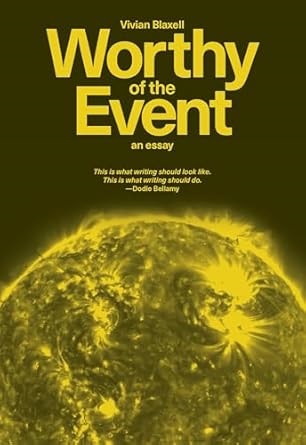 Your top five authors:
Your top five authors:
Anthony Trollope: His sentences are perfect, and his stories of the Victorian middle classes entrance me.
Jenny Erpenbeck: Erpenbeck just gets more masterful with each novel. Her ability to braid large historical events with intimate life is astonishing to me. I wish I could write like that.
Sei Shōnagon: See above.
Daša Drndić: Her novel Trieste is the most powerful thing I have ever read, both in terms of the story itself and in terms of what Drndić does with the novel form and how she does it. To be honest, I don't much care for her other novels, but Trieste is so great, she is forever on my best writer list.
Robert Glück: There is always something so provocative and energizing about Glück's work, and something that encourages me to try new things with writing. I go back and back to him.
Charlotte Brontë: I read Jane Eyre every year. I think Villette is profoundly underappreciated and under-read.
Book you've faked reading:
James Joyce's Ulysses. What can I say? I couldn't do it, but I am too ashamed to admit I couldn't do it. Now the cat's out of the bag, I suppose.
Book you're an evangelist for:
Robert Glück's Margery Kempe. I'm always telling people to read this. Mostly they do not.
Book you've bought for the cover:
I've never seen a book cover good enough to make me buy the book without examining what is inside first.
Book you hid from your parents:
My mother was happy for me to read everything and anything I wanted to read. I had full access to her own library as soon as I could read. I never hid anything I read from her.
Book that changed your life:
The first (1975) edition of South-East Asia on a Shoestring by Tony Wheeler. Using this book, I went to Indonesia, Singapore, Malaysia, and Thailand at a time when not many Australians went there. I've been going ever since. Using this book, I tried traveling on a shoestring, and my life changed completely and for the better (except for my bank balance) when I realized that shoestring is so not for me.
Favorite line from a book:
"There's no better way to make history disappear than to unleash money, money roaming free has a worse bite than an attack dog, it can effortlessly bite an entire building out of existence." --from Go, Went, Gone by Jenny Erpenbeck
Five books you'll never part with:
I throw away books, donate them, sell them. I'm not attached to books for themselves. I'm attached to what is in the books, sometimes. And these days, most of my books are e-books so we never part.
Book you most want to read again for the first time:
Apart from Jane Eyre and The Pillow Book, and a lot of poetry, I don't re-read books. I have tried to re-read John Dos Passos's U.S.A. trilogy again for it was such a mind-bender when I first read it, but it had not the same charms the second time around, which is kind of true of everything in life, really.
Obituary Note
Obituary Note: Edmund White
Edmund White, "who mined his own life story, including his vast and varied catalog of sexual experiences, in more than 30 books of fiction and nonfiction and hundreds of articles and essays, becoming a grandee of New York literary life for more than half a century," died June 3, the New York Times reported. He was 85.
 |
|
| Edmund White (photo: Andrews Fladeboe) |
|
White had success early, beginning with Forgetting Elena (1973), about the rituals of gay life on a fictionalized Fire Island. The Times praised it as "an astonishing first novel, obsessively fussy, and yet uncannily beautiful." His epistolary second novel was Nocturnes for the King of Naples (1978), a series of letters from a young gay man to his deceased ex-lover. Other novels include A Boy's Own Story (1982), a tale of coming out set in the 1950s. His semi-autobiographical novels, The Beautiful Room Is Empty (1988) and The Farewell Symphony (1997), "follow the same unnamed protagonist into adulthood during the 1960s, then through the horrors of AIDS as he approaches middle age."
White's nonfiction works include several memoirs: My Lives (2005), City Boy (2009), Inside a Pearl: My Years in Paris (2014), and The Loves of My Life, a "sex memoir," as he described it. He also published nonfiction biographies of the French authors Jean Genet, Marcel Proust, and Arthur Rimbaud. Other nonfiction books include The Joy of Gay Sex (1977, with Charles Silverstein), States of Desire (1980), and its sequel, States of Desire Revisited (2014), as well as The Unpunished Vice: A Life of Reading (2018).
After graduating from the Cranbrook School for Boys, outside Detroit, in 1962, White moved to New York, where he worked for Time-Life Books and did his own writing at night. The Times noted that he was passing by the Stonewall Inn during the early morning of June 28, 1969, when the police raided it and were met by fierce resistance by patrons in what became known as the Stonewall Riot.
In City Boy, White later recalled: "Up till that moment we had all thought that homosexuality was a medical term. Suddenly we saw that we could be a minority group--with rights, a culture, an agenda."
He left Time-Life that year and spent six months in Rome in 1970, then moved to San Francisco to work as an editor for the Saturday Review. He returned to New York in 1973 and to write, a form of therapy, as he told the Sydney Morning Herald in 2006, that "has always been my recourse when I've tried to make sense of my experience or when it's been very painful."
White won numerous awards for his work, including being named a Pulitzer Prize finalist in 1994 for his Genet biography. He taught writing at several universities, including Brown and Princeton, where he was on the faculty from 1999 to 2018.
He was one of seven members of The Violet Quill, a gay writers' group founded in 1979 that included the soon-to-be celebrated authors Andrew Holleran and Felice Picano, the Times wrote, adding that "the members met regularly to critique one another's work. In 1982, he helped found the group Gay Men's Health Crisis in New York City."
White moved to Paris in 1983 and stayed there until 1998. He discovered that he was H.I.V. positive in 1985. Four of the seven members of the Violet Quill died of AIDS, as did his two closest friends, the literary critic David Kalstone and his editor at Dutton, Bill Whitehead, as well as many other friends and lovers.
Reflecting on living into old age while so many gay men died young, White told the Guardian in 2000: "I do feel some degree of guilt. It's also hard not to feel numb, and the worst thing for a writer is to feel numb. Your natural tendency is to want to forget; but your deepest sense of duty and obligation is to history and to the people you knew and loved."
White produced some of his most original work while in his 80s, the Times wrote, citing in particular A Previous Life (2022), in which "a married man and woman holed up in a ski chalet in 2050 share their sexual histories, including details of the husband's affair 30 years earlier with an elderly writer. The writer is named Edmund White."



